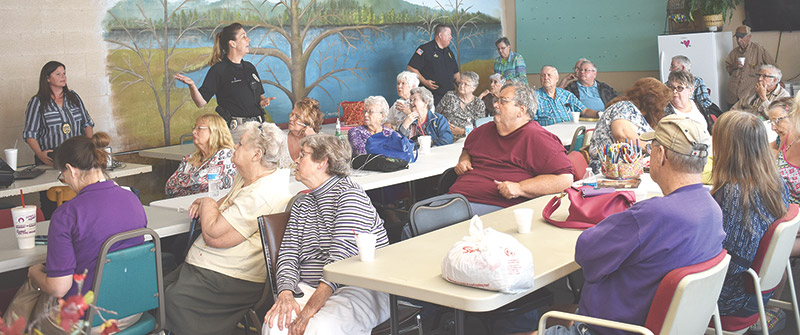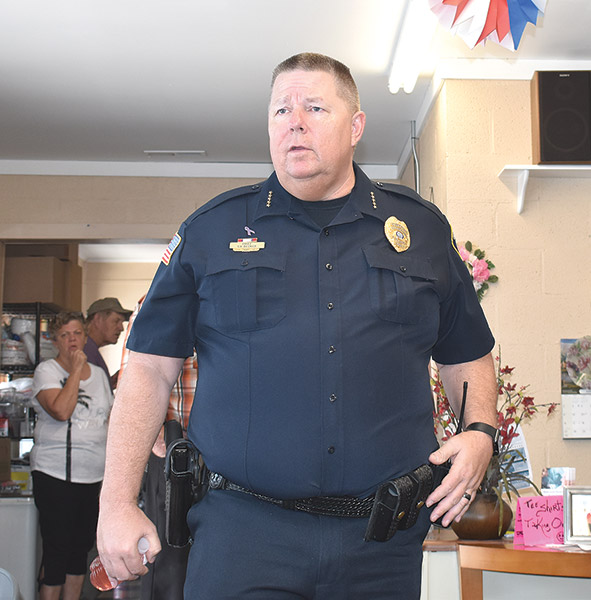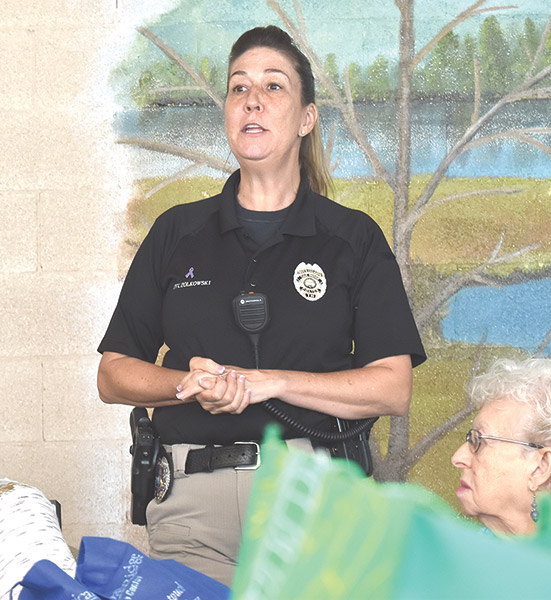Educating seniors on the symptoms of elder abuse
Officers with local law enforcement agencies spoke at the Clinton Senior Center last week to educate senior citizens about the warning signs of elder abuse. The event was in coordination with World Elder Abuse Awareness Day on June 15.
Anderson County Sheriff’s Department Community Relations Director Greg McBroom told those who came to learn that if anyone has any concerns, reach out to him directly.
“We’re here to help and if we can ever do anything to help you, reach out,” he said.
One of the things discussed was scams. McBroom said he frequently speaks at the senior center to discuss what scams to watch out for and reiterated information about IRS and jury duty scams.
“The IRS isn’t calling anybody,” he explained. “They’ll send a certified letter.”
He said one scam that’s currently making the rounds is people calling elderly citizens and claiming to be their grandchild or nephew. They will claim to either be in jail or in need of money, and will request that money be wired to them.
He and other officers present recommended that everyone create a password with family members, so that if they are called, the person on the other end can say the password and confirm their identity.
According to Oak Ridge Police Officer Wendy Sokolowski, there are laws in place that protect the elderly and vulnerable people. To be considered elder abuse, the victim must be over the age of 60. Sokolowski said that Anderson County has a higher-than-average percentage of people that are over the age of 65.
“Anderson County has 19-percent of its people over the age of 65,” she said. “It’s 15.6-percent in the U.S. and Tennessee has 16-percent. That’s why we’re very concerned about all of you. We’re trying to be proactive because we care about you.”
By 2030, those over 65 are expected to grow to 25-percent of Anderson County’s population.
Adult Protective Services is the county’s first responder when it comes to elder abuse, according to Sokolowski. But everyone is legally obligated to report suspected elder abuse.
“If you see somebody being abused, you need to call someone,” she said. “If you know of something and don’t turn it in, you could be charged with a misdemeanor.”
Some of the things that qualify as elder abuse include abandonment, confinement, financial exploitation and physical harm. Confinement can include more than just confining someone to his or her home — it can also involve taking someone’s cell phone or overmedicating them so that they can’t communicate with the outside world.
Sokolowski showed a short video clip of Mickey Rooney, who presented a moving first-person testimony about elder abuse to a Senate committee in 2011.
“He was financially abused,” she said. “He only had $18,000 left to his name when he passed away. We are going out of our way to tell you that we hear you and we’re here for you.”
She added that one out of 14 senior citizens report identity theft. She said that the actual numbers are probably much higher because it is often not reported.
“A person who has been victimized has a chance of dying early because they feel ashamed, defeated and saddened,” she explained. “Most people who are victims of identity theft are ashamed to say anything.”
To report elder abuse, call 888-277-8366. Warning signs include:
• Unexplained injuries
• Broken eyeglasses
• Signs of being restrained
• A caregiver’s refusal to allow you to see the elder alone
• Behavior from the elder that mimics dementia
• Significant withdrawals from the elder’s bank accounts
• Suspicious changes in wills, power of attorney, titles or policies
• Duplicate billings for the same medical service
• Evidence of over- or under-medication




